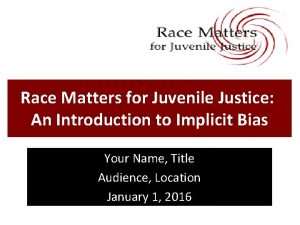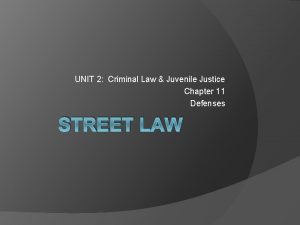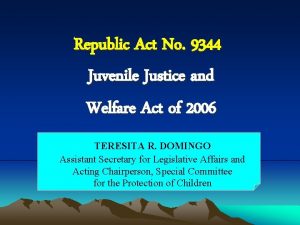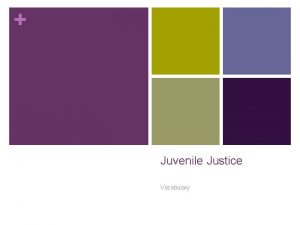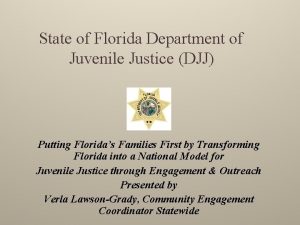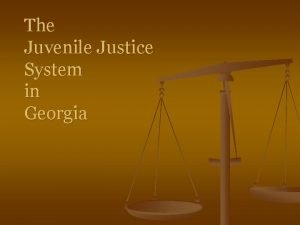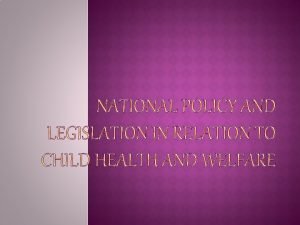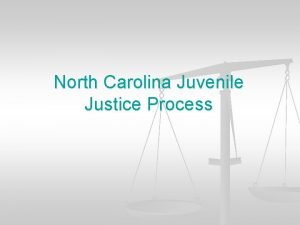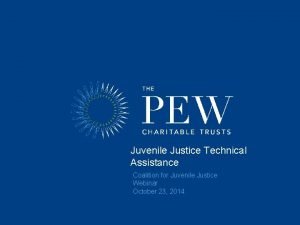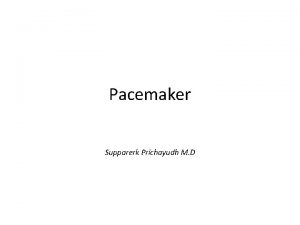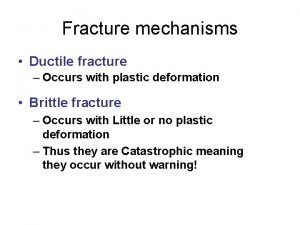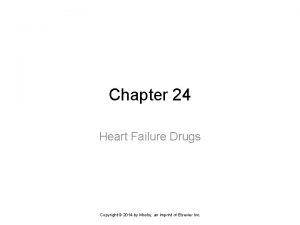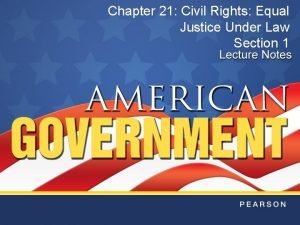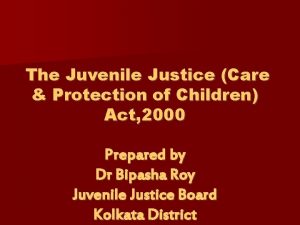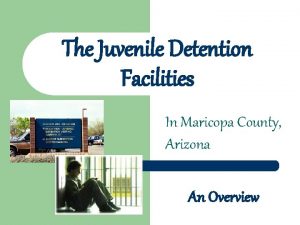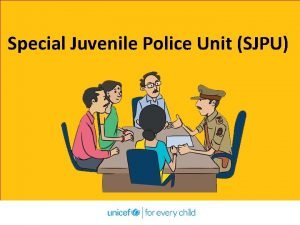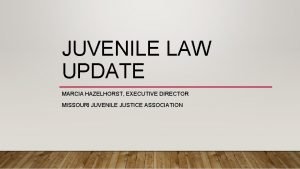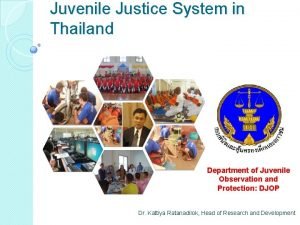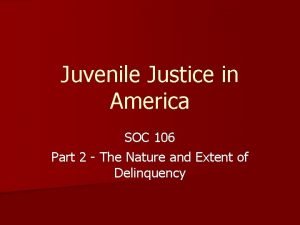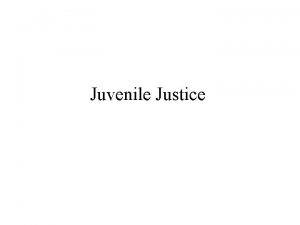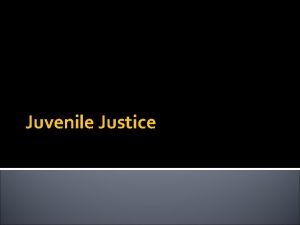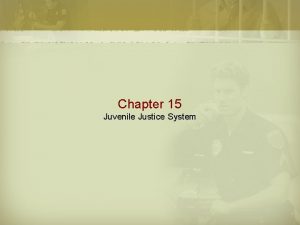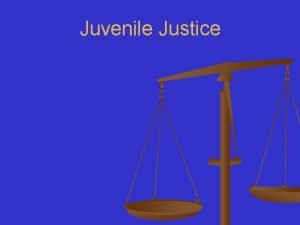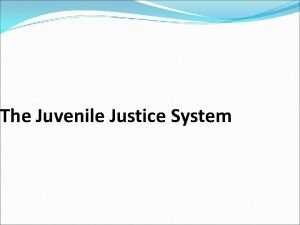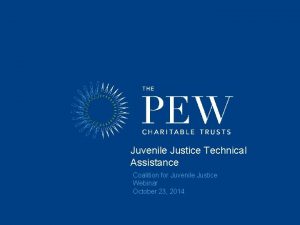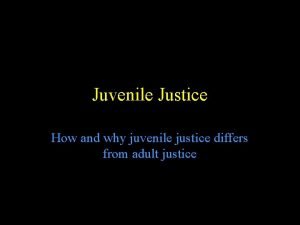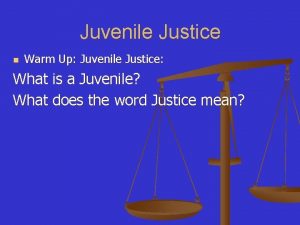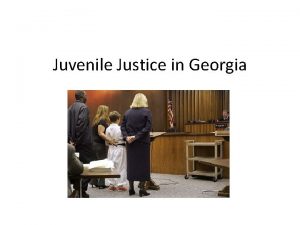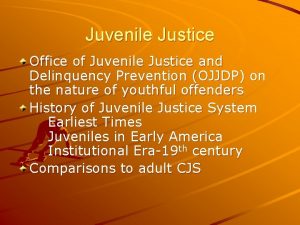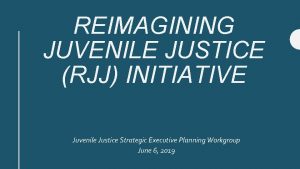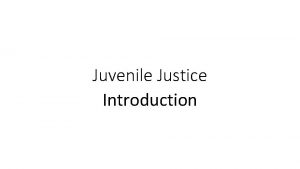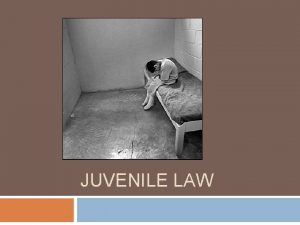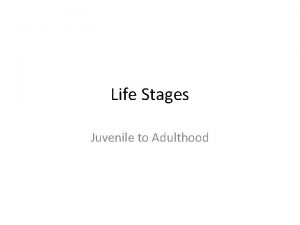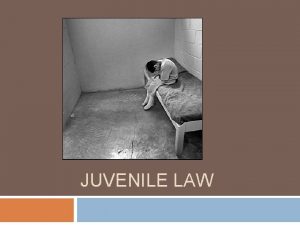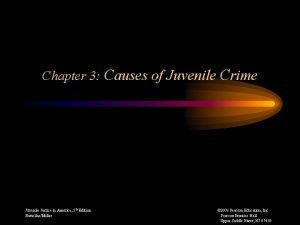Chapter 16 Juvenile Justice Failure of family a



























- Slides: 27

Chapter 16: Juvenile Justice


• Failure of family a cause of delinquent behavior. • Families had failed to teach proper values and respect for authority.

• Solution to failure of family: • Separate juvenile court to assume the responsibility that had been the family’s job. • Instead of punishing young people through adult system, a separate juvenile court would seek to REHABILITATE juveniles by teaching morals and learning community values.

• First Juvenile Court: • Cook County, Illinois, 1899 • Juvenile courts were designed to be informal, allowing the court to act as parent/guardian of child.

• Parens Patriae: • “Parent of the country. ” • Courts assumes role of a parent and was permitted to do whatever it thought necessary to help the child.

• Three groups of juveniles: 1. Delinquent offenders: youths who have committed acts that would be crimes if committed by adults. 2. Status offenders: youths who committed acts that would not be crimes if committed by adults (CURFEW)

3. Neglected and abused children: need the courts protection from parent or guardian. § Neglect Case: occurs when a parent or guardian is charged with failing to provide adequate food, clothing, shelter, education and medical care.

• An abuse case, occurs when a child has been sexually, physically, or emotionally abused.

• In both, neglect and abuse cases, a judge must decide whether the child needs the protection of the courts. • Courts must determine whether the child should remain with the family while under court protection

• In both neglect and abuse cases: • Judge works closely with social service agencies. • Judge usually sets certain conditions for the child to remain with his or her family, such as participation by the parents in a counseling program or a later hearing to monitor the progress of the case. • Judge may also decide to place the child with relatives or in foster care.

• Juvenile age of maturity: Can prosecute in adult court: • Most states is 18. • Some states is 16 or 17 • Illinois: 18 years old

• Humanitarian philosophy -Emphasizes rehabilitating the offender • Control philosophy – emphasizes punishing the defender.

STATUS OFFENSES

• Status Offenders: Offenders • Youths who commit cases which are not crimes for adults – drinking alcohol under age 21 • Most are runaways or have drug problems (alcohol/drugs) • Face charges such as: “beyond control” and “habitually disobedient, ” or truant from school.

• Status Offenders (Continued) • Some are trying to escape abusive or difficult home situations.

Programs for runaways: • Primary resource for runaway and homeless youth is a national network of shelters. (1800 -RUNAWAY) or www. 1800 RUNAWAY. org

• Status offenses make up 20% of all juvenile arrests. • As a general rule, a single act of unruly behavior is not enough to support a finding that a juvenile is in need of court supervision; rather, juvenile must be habitually disobedient or has repeatedly run away, skipped school, or been out of control

PINS (person in need of supervision) • Because of problems at home, parents sometimes ask the courts to file a PINS – petition against their child.

PINS (person in need of supervision) • Children can defend their conduct by showing their act was justified or the parent were unreasonable and at fault. • If child is correct, the PINS petition might be withdrawn by the court and replaced by a neglect petition against the parent

Juvenile Justice Today

Problems with Juvenile court system in the 1960 s. • Many people argued that the system was providing harsher treatment that the adult system without the constitutional rights provided in adult courts.

Solution to problems with Juvenile Court System: • In 1966, the U. S. Supreme Court handed down several decisions which began to change theory and operation of the juvenile justice system.

The Gault Decision • Gave young people many of the same rights as adults

In re Winship (1970) • A juvenile charge with a criminal act must be found “delinquent by proof beyond a reasonable doubt, ” the same standard required in adult criminal court.

• Mc. Keiver v. Pennsylvania (1971) • The Court decided that jury trials were not required in juvenile cases. • It expressed concern that jury trials could hurt juveniles by destroying the privacy of juvenile hearings.

• The Juvenile Justice and Delinquency Prevention Act of 1974: 1974
 Race matters for juvenile justice
Race matters for juvenile justice Criminal law and juvenile justice unit 2
Criminal law and juvenile justice unit 2 R.a. no. 9344
R.a. no. 9344 Cottage reformatories
Cottage reformatories State of florida department of juvenile justice
State of florida department of juvenile justice Juvenile justice alternative education program
Juvenile justice alternative education program Juvenile justice system georgia
Juvenile justice system georgia Juvenile justice act 2000
Juvenile justice act 2000 North carolina juvenile justice
North carolina juvenile justice Juvenile justice system in georgia
Juvenile justice system in georgia Coalition for juvenile justice
Coalition for juvenile justice Minnesota juvenile justice system
Minnesota juvenile justice system Ventricular escape rhythm
Ventricular escape rhythm Supparerk vision center
Supparerk vision center Ductile failure example
Ductile failure example Chapter 24 heart failure drugs
Chapter 24 heart failure drugs Chapter 21 civil rights equal justice under law
Chapter 21 civil rights equal justice under law Chapter 11 and then there were none
Chapter 11 and then there were none Cncp and ccl
Cncp and ccl Juvenile detention center arizona
Juvenile detention center arizona State of ct division of criminal justice
State of ct division of criminal justice Sjpu full form
Sjpu full form Dermatomyocytis
Dermatomyocytis Missouri juvenile officer performance standards
Missouri juvenile officer performance standards Department of juvenile observation and protection
Department of juvenile observation and protection Juvenile delinquents act
Juvenile delinquents act Soc 106
Soc 106 Newspaper article on juvenile delinquency
Newspaper article on juvenile delinquency
